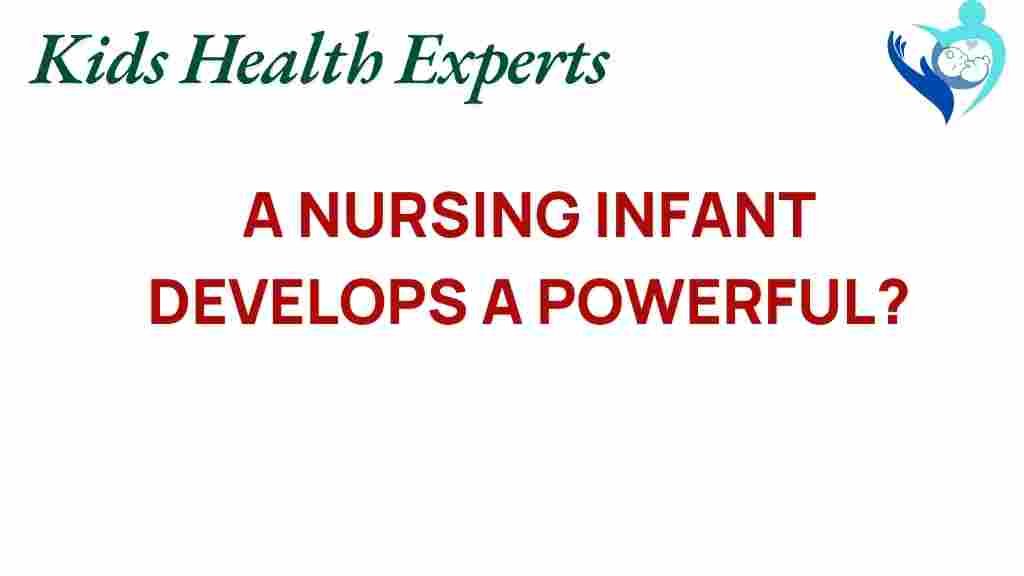The Remarkable Power of Nursing: What Infants Gain from Breastfeeding
Breastfeeding, often referred to as nursing, is an age-old practice that holds immense significance in the early life of an infant. It is not just a method of feeding; it encompasses a myriad of health benefits that contribute to infant development, maternal health, and the overall nutritional well-being of both mother and child. In this article, we will explore the remarkable power of nursing, highlighting how breastfeeding fosters infant development, strengthens the immune system, and enhances the bonding experience between mother and child.
The Nutritional Foundation of Breastfeeding
Nursing provides infants with the essential nutrients they need during their crucial early life. Breast milk is uniquely tailored to meet the nutritional requirements of growing babies. Here are some key aspects of nutrition from breastfeeding:
- Complete Nutrition: Breast milk contains the right balance of proteins, fats, and carbohydrates that are vital for infant growth.
- Vitamins and Minerals: It is rich in essential vitamins like A, C, and D, as well as minerals like calcium and iron, critical for development.
- Hydration: Breast milk provides hydration in addition to nourishment, which is crucial for infants, especially in hot weather.
- Bioavailability: The nutrients in breast milk are more easily absorbed by the infant’s body compared to formula.
Boosting the Immune System
One of the most remarkable benefits of nursing is its ability to enhance the infant’s immune system. Breast milk contains antibodies and other immunological factors that help protect infants from infections and diseases during their early life. Key points include:
- Antibodies: Colostrum, the first milk produced, is rich in antibodies that help fight infections.
- Reduced Risk of Illness: Breastfed infants tend to have lower incidences of respiratory infections, gastrointestinal diseases, and other illnesses.
- Long-term Health: Studies indicate that breastfeeding can lower the risk of chronic conditions later in life, such as obesity, diabetes, and heart disease.
The Bonding Experience
Nursing is not solely about nutrition; it plays a critical role in the emotional and psychological bonding between mother and infant. The act of breastfeeding promotes closeness and attachment, which are vital for the infant’s emotional development:
- Skin-to-Skin Contact: Nursing facilitates skin-to-skin contact, which is crucial for bonding.
- Emotional Security: The act of breastfeeding can help infants feel secure and comforted in their mother’s presence.
- Maternal Connection: The release of oxytocin during breastfeeding fosters maternal instincts and enhances the mother-child connection.
Health Benefits for Mothers
While the focus is often on the benefits of breastfeeding for infants, it is essential to recognize the positive impacts on maternal health as well. Nursing can provide several health benefits, including:
- Weight Loss: Breastfeeding can help mothers lose weight gained during pregnancy by burning extra calories.
- Reduced Risk of Diseases: Women who breastfeed have a lower risk of developing breast and ovarian cancer, as well as type 2 diabetes.
- Hormonal Balance: Breastfeeding can help regulate hormones, promoting a faster return to pre-pregnancy conditions.
Steps to Successful Breastfeeding
For new mothers, the journey of nursing can sometimes present challenges. Here’s a step-by-step guide to ensure a successful breastfeeding experience:
- Get Educated: Attend breastfeeding classes or consult healthcare professionals to learn about proper techniques.
- Start Early: Initiate breastfeeding within the first hour of birth to establish a good feeding routine.
- Ensure Proper Latch: A proper latch is crucial for effective breastfeeding. Seek help from lactation consultants if needed.
- Stay Comfortable: Find a comfortable position for both you and your baby to promote effective feeding.
- Feed on Demand: Allow your baby to nurse whenever they show signs of hunger, typically every 2-3 hours.
- Stay Hydrated and Eat Well: Maintain a balanced diet and drink plenty of fluids to support milk production.
Troubleshooting Common Breastfeeding Issues
Despite the many benefits of nursing, some mothers may encounter challenges. Here are common issues and troubleshooting tips:
- Sore Nipples: Apply lanolin cream or use nipple shields to alleviate discomfort.
- Low Milk Supply: Ensure regular feeding and stay hydrated. Consult a lactation consultant for additional support.
- Engorgement: If breasts become overly full, nurse more frequently or express milk to relieve pressure.
- Baby Refusing to Latch: Try different positions or skin-to-skin contact to encourage your baby to latch on.
The Long-term Impact of Breastfeeding on Infant Development
The benefits of breastfeeding extend well into childhood and beyond. Research shows that infants who are breastfed have better outcomes in several areas:
- Cognitive Development: Some studies suggest that breastfeeding may be linked to higher IQ scores and improved cognitive abilities.
- Social Skills: The bonding experience during nursing can lead to better social and emotional skills in later life.
- Healthier Lifestyle Choices: Breastfeeding may encourage healthier eating habits and lifestyle choices as children grow.
Conclusion
The power of nursing is profound and multifaceted, providing unparalleled benefits for both infants and mothers. Through breastfeeding, infants gain essential nutrition, develop robust immune systems, and forge emotional bonds that last a lifetime. For mothers, the act of nursing can lead to improved health outcomes and a deeper connection with their child. While challenges may arise, the long-term rewards of breastfeeding make it a worthwhile endeavor. Educating oneself on the benefits of nursing and seeking support can pave the way for a fulfilling breastfeeding journey.
For more information on breastfeeding and maternal health, visit World Health Organization. If you’re looking for support, consider reaching out to a local lactation consultant or support group here.
This article is in the category Nutrition and created by KidsHealthExperts Team
